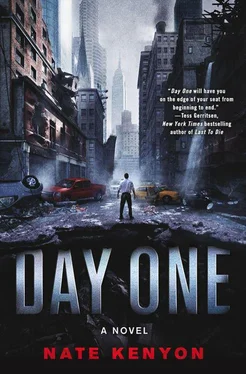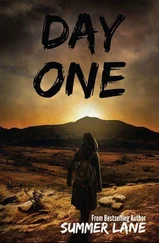Hawke had never seen the inside of the man’s apartment, but he imagined a dimly lit, musty place with piles of old newspapers and boxes in crooked, leaning towers. When he found out Hawke had once worked at the New York Times, Lowry tried to get him to write a story about government conspiracies. Hawke told him to call his congressman. There was the incident in the laundry room, among others, things Hawke didn’t like to think about for too long. Everything he and Robin had tried to do, including a conversation with the useless super, had achieved nothing, and the tension between the two men had grown into something close to viciousness. It was causing more stress between Hawke and his wife, which was one thing they didn’t need. She’d had trouble getting pregnant the second time, and then she’d been bleeding off and on as the pregnancy had progressed, and her doctor had told her she had a subchorionic hematoma and she had to take it easy.
That prick Lowry was only making things worse. Enough was enough; Hawke would talk to the man again tonight, and if that didn’t work he would have to go to the police.
The thought made Hawke’s stomach churn. His own personal history with the authorities usually made him avoid them like the plague, but this had to be settled, once and for all.
* * *
Hoboken was just beginning to stir this early in the morning. In the street, the September air was crisp, the sky a flawless steel blue. Hawke smelled the river, heard the calls of geese flying overhead. He started thinking about other ways to make things right with Robin. Maybe another trip to Cuttyhunk Island, near Martha’s Vineyard off the Massachusetts coast. It would be good to get away, have a little quiet time. Hawke used to go to a cottage his aunt owned there when he was a boy, and it had a special meaning for him and his wife: It was where they had gotten married.
Still thinking about how to make the trip work, he put his sunglasses on and chewed an aspirin and then the energy bar, chocolate grit in his teeth as he made his way to the PATH, joining a growing flood of people. It felt good to stretch his legs. He was no gym rat, but he was wiry strong and genetics had been good to him. He kept in shape by walking.
A cabdriver honked at him as he crossed the street, flashing him the finger. Someone cursed next to him and Hawke said, “Excuse me?” before realizing the man had a Bluetooth in his ear and smartphone in hand. The man wore a hand-tailored suit and shoes polished to a sleek shine. He shot Hawke a withering look, as if he were observing the biggest idiot on the planet, and continued his loud conversation.
Once underground, Hawke stuck his sunglasses up on his head and joined the slowly shuffling line to buy a coffee. He and Robin couldn’t afford any extra costs on their stretched-tight budget, but he needed it badly and he had a few minutes before the PATH arrived. Train service had finally been fully restored after Hurricane Sandy, and it was good to see the crowds returning, although he could do without the lines.
When he made it to the front, the waif-thin girl behind the counter didn’t even look at him, her gaze locked on her iPhone screen. Three piercings glittered, one through each eyebrow and a stud through her lip, and her hair was cut short and streaked with red. She was frowning and jumpy, like she’d had too much caffeine or something stronger.
Thomas would have been intrigued by the piercings. He pointed out things that were different, seemed to want to understand them, even if he didn’t say much. This girl wasn’t saying much, either. Something was annoying her about the iPhone; she sighed, poking at the screen in frustration with a tip of pink tongue poking between her lips. In his earlier life, Hawke would have struck up a conversation with her, maybe helped her fix the problem. But he was a married man now, going on thirty, with a young son and another child on the way. He wasn’t running around New York City hacking into big-business networks and chasing stories the way he had been only a few years ago, feeling like a rogue reporter and Internet cowboy. And let’s face it, you got sloppy and made mistakes. Big ones. His hacker skills used to give him an edge in the reporter rat race, allowed him to see stories in ways others did not. But things changed. Maybe he’d lost that edge, the killer instinct all the best journalists needed to get to the truth.
The coffee was scalding hot, and he burned the roof of his mouth on the first sip. He settled into a window seat on the train, watching people situate themselves, many of them on their smartphones or tablets, maneuvering through the aisles with quick glances and shuffling feet. Hawke liked to watch people; he learned a lot. Maybe Thomas was like him that way. The same man was still talking on his Bluetooth, muttering something about derivatives and foreign exchange rates, and he jostled a young woman on his way past hard enough for her to stumble. He moved down the aisle until he was lost in the crowd.
A man across from Hawke had been watching, too. He clutched a rolled-up sign and had a large duffel bag tucked between his feet, and his clothes were nice but faded and slightly wrinkled, as if he’d worn them once or twice already between washings. There was a shadow of stubble across the man’s cheeks, and his jaw muscles twitched.
“What a prick,” Hawke said, motioning toward where Bluetooth had disappeared. He nodded at the duffel. Something about the shape of it, bulky, with angles and points, made him uneasy. “You going to a rally or something?”
The man stared at him, openly hostile. The Occupy Wall Street movement had evolved recently. Now they were focused on high-frequency computer trading and credit swaps, which had bloomed once again with the market recovery. The 1 percent were richer than ever.
But if this man was going to a rally on Wall Street, he was on the wrong train. Maybe it was somewhere uptown. Hawke looked around, spotting several others with packs and signs, and suddenly remembered he was wearing a tie and suit jacket, the nicer of the two he owned. “I’m not a broker,” he said. “I’m a journalist.” It sounded stupid and insincere: I’m with you, buddy. He had no idea what this man’s life was like.
The man kept staring, then shook his head in disgust and touched his jaw. Hawke reached up to his own face and felt the speck of tissue still clinging to him from when he’d nicked himself shaving. He picked it off and stared at the small circular brown stain on his palm. Great. One hell of a start to the day. “Thanks,” he said, but the man just pulled the duffel bag closer and looked back toward the spot where Bluetooth had disappeared.
7:35 A.M.
A WOMAN TOOK THE SEAT next to Hawke, huffing, her meaty thighs spilling over into his space. He sipped his coffee, feeling his body becoming more alert. His mind had already started churning, imagining a Web site that tracked civil unrest by mapping police presence, cross-referenced with politicians’ statements and Twitter alerts, to create a kind of gauge for the level of tension in a particular area. A thermometer that took the temperature of a given confrontation and predicted violence. It could help people avoid a certain area—or search it out, if that was their thing. When he worked for the Times he had blogged during Hurricane Sandy and created a real-time map that tracked the hurricane’s path and predicted which areas of the city were the most vulnerable based on criteria like building clusters, street maps and distance to emergency services, and tied that to live traffic updates and an orderly evacuation plan. Earlier in his career, working as a freelancer for several local news outlets , he’d covered crime and created a site that tracked police activity in New York City by street, culling data from public logs and police scanners to provide near real-time public safety updates. He’d also built a system for a feature on education that analyzed student test scores and cross-referenced that with public funding levels and census data to show the best school districts, as well as racial and socioeconomic bias.
Читать дальше












